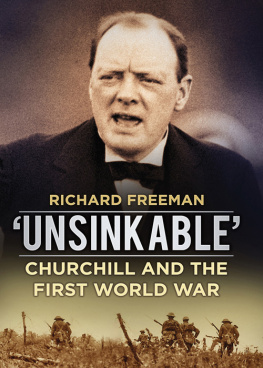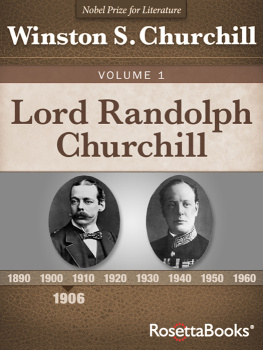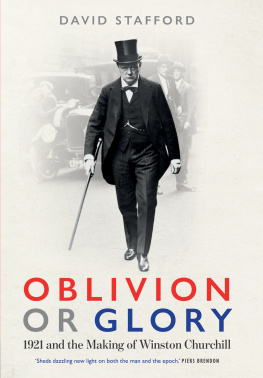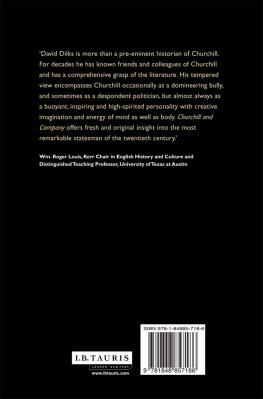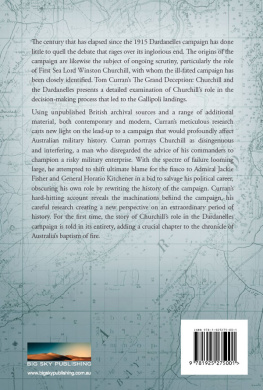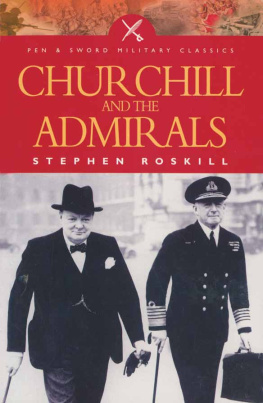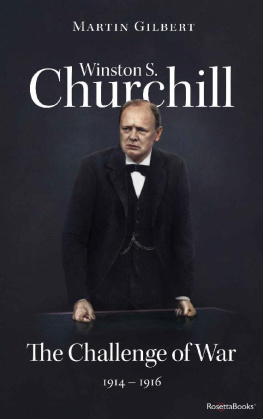Churchill was dubbed the unsinkable politician by the Morning Post when he returned to office in 1917.
CONTENTS
Extracts from the following are reproduced with permission of Curtis Brown Ltd., London on behalf of the Estate of Sir Winston Churchill: The World Crisis 1915; The World Crisis 1911-1914; The World Crisis 1916-1918; Thoughts and Adventures; Great Contemporaries; Painting as a Pastime. All Copyright Winston S. Churchill.
The following are reproduced with permission of Curtis Brown Ltd., London on behalf of C&T Publications: Winston S. Churchill Volume III: Companion Volume 2 by Martin Gilbert; Winston S. Churchill Volume III by Martin Gilbert; Winston S. Churchill Volume III: Companion Volume 1 by Martin Gilbert; Winston S. Churchill Volume IV: Companion Volume 1 by Martin Gilbert.
The following are reproduced with permission of Curtis Brown Group Ltd: Soames Clementine Churchill and Soames Speaking for Themselves.
Material from From Dreadnought to Scapa Flow Volume 2 by Marder (1956) is reproduced by permission of Oxford University Press.
Material from Fear God and Dread Nought Volume II by Arthur Marder published by Jonathan Cape is reproduced with the permission of The Random House Group Ltd.
Attempts to trace the copyright owners of Memories and Reflections by H.H. Asquith have proved unsuccessful. The publishers undertake to correct any omissions on reprint.
I am most grateful for the help of the Parliamentary Archives in tracing the three wartime Acts of Parliament relating to the suspension of the rule regarding the re-election of ministers on assuming office.
Battle diagrams: Marcus Freeman.
On 11 November 1918, Lloyd George, the Prime Minister, called a meeting of his Cabinet. Of those ministers who had gone to war on 4 August 1914, only two were at the Cabinet table to savour the fruits of victory: Lloyd George and Winston Churchill.
They had survived for two reasons: they were the only two senior politicians who understood war and the only two who had the courage to wage it. They were fearless, ruthless and determined.
Lloyd Georges role in the war was uncomplicated. He was one of the few strategic thinkers in the Cabinet. Free of any connections with the army or the aristocracy, he was able to bring a fresh, pragmatic eye to the problems of the war. His innate cunning enabled him to outmanoeuvre anyone who was less committed. Alien as war was to his character, to him defeat was inconceivable.
As to Churchill, he was born for war and from early childhood had been enthralled by the stories of battles fought by his famous ancestor, the Duke of Marlborough, in the War of the Spanish Succession (170114). In 1893, Churchill entered Sandhurst Military College and was commissioned as a cavalry officer in 1895. He then served in India and the Sudan before becoming a war correspondent at the time of the Second Boer War (18991902). By then, he had published two books on his soldiering both huge commercial successes as well as a novel. His time in South Africa resulted in a stream of newspaper reports on the war as well as two further books. Ten years later, Churchill was appointed First Lord of the Admiralty. By 1914, he had the perfect qualifications for a war minister.
And yet it all went so badly wrong. Not because Churchill failed as a minister, but because he had enemies. In particular, he had made an enemy of the Tory Party when he crossed the floor of the House, in 1904, to join the Liberals. His meteoric rise through a series of ministerial posts only served to deepen the hostility of his former colleagues. As a result, the Tory Party spent the early part of the war seeking to get Churchill out of office they succeeded in May 1915. They then spent two years keeping him out until his dramatic return in July 1917.
Although no other senior politician was more suited to run the 191418 war, no one was more obstructed in that task. This book tells the story of how, almost from the first month of the war, Churchill became the victim of false stories, libellous innuendoes and malicious attacks as his enemies sought to remove him from power. His heroic action at Antwerp was presented as a fools errand. He was made the scapegoat for the bungled Dardanelles campaign. He was kept out of the 1915 coalition by men of less than half his stature. He was denied a brigade command in 1916 for purely political reasons. His return to power was blocked time and again by his old party.
But when, finally, Lloyd George found the courage to face down Churchills denigrators, the fallen politician came back as Minister of Munitions. From July 1917, to the day of victory, the war belonged to Lloyd George and Churchill.
The story of Churchill and the First World War is one of a country that foolishly denied itself the services of one of the two greatest war ministers of the twentieth century. Fortunately, Lloyd George was big enough to recognise Churchills talents. And Churchill was big enough to rise to every challenge posed by the war.
CHAPTER 1
A desperate expedient to meet a desperate situation.
In a field outside Antwerp stands a man in a flowing cape, sporting a yachting cap and puffing on a huge cigar. Behind him are 400,000 terrified citizens, who have been under siege for weeks. He looks into the distance from where the thundering noise of German heavy guns can be heard. This man is the Allies last hope and his name is Winston Spencer-Churchill, the First Lord of the Admiralty. He has been despatched to Belgium in a last desperate effort to stem the advancing Germany armies.
Two days earlier, on 2 October 1914, Churchill had been on a train to Dover. His mission to consult with the Belgians was important but not pressing. But when he stepped off the train at Dover he was handed a telegram which urgently recalled him to London. Around midnight, he was back in Lord Kitcheners London house and there he found three despairing men: Kitchener (War Minister), Sir Edward Grey (Foreign Secretary) and Sir William Tyrrell (Greys Private Secretary). What had brought them together was a telegram from Sir Francis Villiers, the British Envoy Extraordinary to Belgium. His message had been blunt: the Belgians were abandoning Antwerp.
Even Field Marshal Lord Kitchener, hero of the Sudan and architect of victory in the Second Boer War, reeled under the news. If Antwerp fell, the German armies would have a clear route through to France. The small British army of six divisions, sent to war with such high hopes, had been in retreat almost from the day that it met the advancing Germans. The French were also in retreat.
Britain and France faced defeat within days, yet Kitchener had no suggestions to make and all that he and Grey could do was to wring their hands. Then Churchill spoke up. True, it might be impossible to hold on to Antwerp, but what about delaying the German advance? Every day of delay was one more to bring forward reinforcements. Kitchener and Grey seized on the plan and soon Churchill was once more speeding towards Dover.
The official naval historian of the First World War described this mission as a desperate expedient to meet a desperate situation. Churchill was to offer the Belgians huge reinforcements if they would hold out for just a few more days.
At home, the War Office and the Admiralty set to work that night to find men and guns to send to Antwerp. Meanwhile, an empty-handed Churchill reached the city at 3.00 p.m. on 3 October, where he met the King of the Belgians and the Belgian Prime Minister. By early evening, he had an agreement. The Belgians would hold on in return for the promise of large-scale support. In a long telegram to London Churchill reported that the Belgians were sure that they could hold the city for at least three days.
Next page
